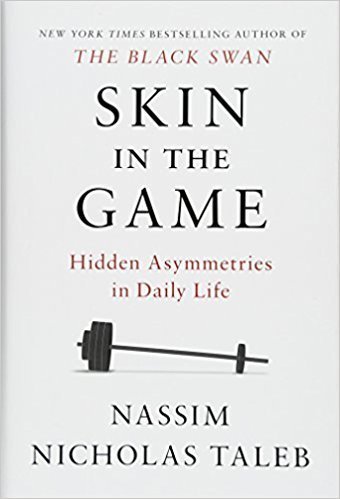"Black swan" author new book: "the same boat in the same boat" in economics, how much influence do we have?
FROM 36Kr
How much water a barrel can hold depends on its shortest board. Thus, each element of the barrel has a potential impact on the whole. But there is a premise, if the rotten wood is not cleared away, even if the shortest board is very high, the barrel is also side loading. This is Nassim Nicholas Taleb, author of "black swan," about his new book, "Skin in the Game."

If you're looking for a surgeon to perform an operation, would you pick a doctor who looks like a butcher? A normal person would at least choose someone who looks like a doctor and has surgery. That is to say, in our daily life, at the time of making decisions, we are more inclined to choose good appearance, even if the doctor is actors, nor do we choose the butcher. The logic is that to play a particular role, you must at least make the effort or pay the price.

The same logic can answer these important questions:
1.What is the difference between the truth and the excuse?
2.What is the difference between true virtue and prudery?
3.What is the essential difference between honor and sacrifice?
4.What is the difference between religion and posturing? (in function, the Pope is an atheist.)
5. How to rationalize rent-seeking behavior, indicating that it does not lead to economic inequality?
6.Why don't you tell someone what you're going to do, just talk about what you've done?
even
7.Where can I find a car?
What is "Skin in the Game"? This expression is often misleading, giving the listener a sense of motivation: offering a bonus will make employees work harder and so on. But there are two sides to everything. You can also understand that you and I are in the same boat, and if I do, you should pay the price. If someone does something wrong and hurts the other person, they should shoulder the responsibility and accept the punishment. Since everyone is on the same boat, there is an opportunity to be motivated, and there is a risk of being punished.
My point is that there is a very important side to this logic: to allow the willingness to accept punishment as a prerequisite for participation, as a screening mechanism to help the overall progress. Whether in nature or in human society, a system that runs normally requires all participants to take on potential risks. Policymakers must be responsible for their decisions and pay a price when they fail. Otherwise, the world would be very fragile and prone to collapse. In this regard, the current public for would-be experts generally are discontented, think these so-called experts are received high education, on the surface is very professional, but to talk to do not pay the price, and repeat one's mistakes, not just one person makes mistakes sometimes, but rather the collective failure. Have you ever thought that, on the highway, cars drive so fast, but few of them have a major accident, causing dozens of casualties? Such accident actually not much, because if there was a big accident, the driver himself is hard to survive those dangerous driving the driver accepted the price, and most do or be revoked license, so, drive the premise of this activity is to "sign" life and death, don't play by the rules of the participants will pay the price. This premise is a screening mechanism, which is the risk management tool for the normal operation of society, and its essence is risk sharing, both natural system and human society. If a ship crashes, the captain loses his job. If the pilot fails, he will fall with the plane. Financial managers, if they don't think about risk, end up losing their jobs and working hard. If they trade all their own money.
The system itself will not learn progress, because the people in the system each learn each other, the progress speed is different. This is also a puzzle in today's society.
The system learns at the collective level by selecting mechanisms: eliminating the factors that affect overall health. But the premise is that all factors are likely to be eliminated.
The improvement of the quality of a city's food and beverage is the improvement in the quality of the fittest, rather than the level of the individual chef in a restaurant. But standing government dining hall is not bound by elimination mechanism, if participants do not need to pay the price, then the whole evolutionary mechanism will collapse: armor was supposed to be eliminated, let b be the whipping boy, with survive a rising in the whole system, the well-being of the whole system is deteriorated, collapse eventually die. But the whole social science community, and the bureaucrats, have not focused on this crucial selection mechanism. Why is that? Because, in natural science, humanities scholars don't need to pay for his mistakes, they in academia, feel there is no difference between the academic and the real, but is not the case in reality. They teach evolution to students in class, but they don't practice it themselves, and they feel that evolution doesn't apply to them. These scholars almost unanimously agreed that official authority should be built, and this theory would be the top of the academic pyramid.
The example of a surgeon in this article is to say that if a surgeon does not perform well, he will pay the price, lose his reputation, or even the whole future. From this point of view, we can confirm whether a subject has met the technical and standard requirements. But now many of the people who advise and advise on the big business, many of them embroidered pillows, are likely to be planning our lives and considering intervening in Libya's internal affairs. They seem to be actors in certain roles, with a set of well-spoken words and a meeting after a meeting. It's easy to say it, but the eyes of the public are bright, and if the people on the stage say it too well, we know that he may be different.
Water plumbers, bakeries, engineers, tuners' technical skills, and their customers to judge. The doctor's technique can be judged by the patient. The mayor of the town, well done, can be judged by the public. Mathematicians, physicists and other natural scientists have more rigorous and precise rules. These professionals can be called experts, and 99% of them are subject to the rules, and if they make mistakes, they pay the price. But macroeconomists, behavioural economists, psychologists, political scientists and commentators, and policy makers at think-tanks, are not experts. Bureaucratic scholars are unprofessional, often judged by other bureaucrats and academics who are not under pressure to be eliminated from reality. These judgments are made by peers, made by mistakes, and without the cost of survival, and their research is often quoted in one another. Their eyes incentive is: in the appropriate journals, discuss the appropriate topic, try to make some empirical, put forward the theory of sounds quite reasonable, in order to defeat the standard.
In fact, it is not the peers' predictors that judge the forecasters' work, nor the judges who hold certain accepted standards, but accountants. Recognized standards are often deceive: politicians often in order to promote economic growth, make the whole system are overwhelmed, debt and the consequences are usually fall on his successor, leave a mess for his successor.
Because the architects will evaluate each other, one architect will not do well, the other architects will point out. But the resentment of bureaucrats can only come from the masses. The principle of public judgment is simple: the smaller the field, the deeper the kung fu. (in the jargon of complex theory, the degree of specialization is related to its size.) Now the irony is that the world is getting more and more complex, and the people who are full of macroscopic theory have more and more influence. What we need to do is decentralize (allow local governments to take action themselves and make the process transparent), rather than centralize power, as we do now.
Moreover, for the past 4,000 years, taking risks for their own actions is the moral code of human society, which everyone must observe, but not recently. In the past, those who encouraged war had to go to war in person. Most of the Roman emperors died on the battlefield, and few of them died in their beds (unless they were poisoned by poison). To obtain a higher status, it is necessary to accept a higher risk: Alexander the great, Hannibal and Napoléon is not only personally showed great courage in battle to gain power. Courage is the only virtue that cannot be assumed. Knights and knights are honored for their courage, and their duty is to protect those who give them their title. Those who excel in history take great risks, which is the unchanging truth of civilization. (almost all civilizations, except the pharaohs of Egypt and the Ming dynasty, were once at the height of power, but soon perished.)